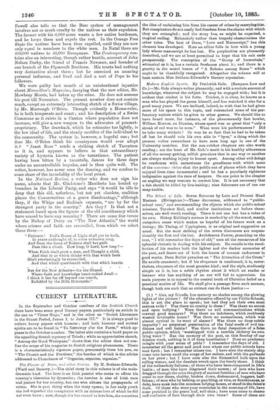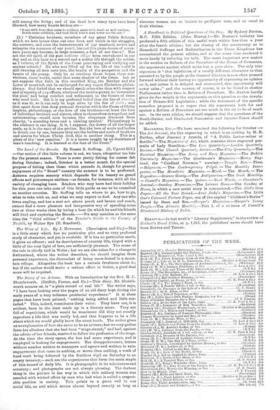The School of Life. Seven Sermons by Late and Present
Head Masters. (Rivingtons.)—These discourses, addressed to "public- school men," and recommending the objects which the public-school missions, Toynbee Hall, and similar institutions set before them- selves, are well worth reading. There is not one but has a value of its own. Bishop Ridding's sermon is marked by all the sound, manly; outspoken sense which makes us hopeful of his future work as a bishop; Mr. Thring, of Uppinghatn, is as original and suggestive as usual. Bat the most striking of the seven discourses are unques- tionably the first and the last. Archdeacon Farrar, preaching on the text, " I will remember the days of old," uses all the resources of his splendid rhetoric in dealing with his subject. He recalls to the recol- lection of his readers both the lighter and the darker memories of the past, and draws out of both the lesson of earnest endeavour in good works. Dean Butler preaches on "The Attraction of the Cross." He avoids ornament ; but if his eloquence is unadorned, it is, never- theless, eloquence of the most genuine kind ; and the style, studiously simple as it is, has a noble rhythm about it which no reader or listener who has anything of an ear will fail to appreciate. Its main purpose is to appeal to the central truth of Christian belief as a practical motive of life. We shall give a passage from each sermon, though both are such that no extract can do them justice :— (1.) "Alas, my friends has memory no shades among the glowing lights of the picture ? Of the education offered by our Public Schools, this is not the place to speak; but had they not their own most serious evils ? Was there no cruelty in them-? Was there no secret and open bullying ? Were there no evil communications which corrupt good manners ? Was there no indolence, which recklessly wasted invaluable hours ? Was there no unmanliness, which was almost cynical in its want of shame-? Was there no, deep subtle impurity? no perpetual germination of the fatal seeds of evil tra- ditions. and evil habits.? Was there no fatal despotism of a false public opinion, which worshipped with a terrible idolatry its own lying voice '? Has the memory of the past, on this Sunday of our mission week, nothing in it of deep humiliation ? Does no penitence mingle with your sense of pride ? I remember the days of old. I remember all the great and good men whom our public schools have sent forth : bat I remember others too. I have seen the stately ship come into haven amid the songs of her sailors, and with the garlands on her prow ; but I have seen also the dismantled hulk upon the rolling waters, and the desolate wreck upon the lonely shore. I think of the melancholy failures' of those who have been conquered in life's battle ; of men who have disgraced their names-; of men who have dragged through the mire the glory of ancient families; of men who have come to our doors, shabby, broken down, dishonours:di beggars, half- felons ; of men who by betting, or gambling or vice, or drunkennessi or debt, haAre •sunk, into the oommon•ludging- house, or stood in the felon's, dock. Of those who were year comrades in the morning of life, have none perished in the green leaf, self-slain ; have none come to shame and confusion of face through their own vioes Some-of ■ them are
still among the living; and of the dead how many eyes have been dimmed, how many hearts broken ere-
' Same with lives that came to nothing, some with deeds as well undone, Death came suddenly, and took them where men never see the sun!.
(2.) "Christian brethren, members of our great Public Schools, which we love better than our own lives, and which in the struggles, the sorrows, and even the bereavements of our manhood, revive and reinspire the romance of our youth, has not this pious dream of seven- teen years ago become, in large measure, a fact of our times ? Has not the old spirit of the past noblesse oblige been reawakened in our day and at this hour to a second and a nobler life through the action, as I believe, of the Spirit of the Cross penetrating and vivifying our ancient schools ? He who was lifted up for the life of the world is still drawing all men unto him, the hearts of the prosperous and the hearts of the young. Only let us continue these hopes, these con- victions, these works, under that same shadow of the Cross. Let us not suppose that faith in this crucified King, the Brother and the Lover of mankind, can be exchanged for any vague Christless philan- thropy. God forbid that we should speak otherwise than with respect and sympathy of any efforts, whatever the motive-power, to 'remember the poor,' and bring comfort and refinement to the homes of those who need both. Bat it is my profound belief that the fire of charity, as it was lit, so it can only be kept alive by the fire of faith ; and that apart from that deep personal devotion which the Cross of Christ inspires, philanthropy, or the love of the brethren—at least the love of individual brothers and sisters, often in themselves so repellent and uninteresting—would soon become, like eloquence divorced from charity, a sounding brass and a tinkling symbal.' Philanthropy in the abstract is one thing. It is, I suppose, the dower of all the larger souls, as it is the cant of the pettier. But the love of souls and bodies in detail, one by one, because they are the bodies and souls of brothers and sisters for whom Christ died, this is another thing. This is a plant of the new creation.' It is a lesson taught by no doctrines of man's teaching. It is learned at the foot of the Cross."



































 Previous page
Previous page